- Home
- George Orwell
Homage to Catalonia Page 8
Homage to Catalonia Read online
Page 8
Everyone began cursing and saying why the hell didn't they send us some supports. With a sub-machine-gun or twenty men with clean rifles we could hold this place against a battalion. At this moment Paddy Donovan, who was second-in-command to Benjamin and had been sent back for orders, climbed over the front parapet.
'Hi! Come on out of it! All men to retire at once!'
'What?'
'Retire! Get out of it!'
'Why?'
'Orders. Back to our own lines double-quick.'
People were already climbing over the front parapet. Several of them were struggling with a heavy ammunition box. My mind flew to the telescope which I had left leaning against the parapet on the other side of the position. But at this moment I saw that the four Shock Troopers, acting I suppose on some mysterious orders they had received beforehand, had begun running up the communication-trench. It led to the other Fascist position and - if they got there - to certain death. They were disappearing into the darkness. I ran after them, trying to think of the Spanish for 'retire'; finally I shouted, 'Atras! Atras!', which perhaps conveyed the right meaning. The Spaniard understood it and brought the others back. Paddy was waiting at the parapet.
'Come on, hurry up.'
'But the telescope!'
'Bugger the telescope! Benjamin's waiting outside.'
We climbed out. Paddy held the wire aside for me. As soon as we got away from the shelter of the Fascist parapet we were under a devilish fire that seemed to be coming at us from every direction. Part of it, I do not doubt, came from our own side, for everyone was firing all along the line. Whichever way we turned a fresh stream of bullets swept past; we were driven this way and that in the darkness like a flock of sheep. It did not make it any easier that we were dragging a captured box of ammunition - one of those boxes that hold 1750 rounds and weigh about a hundredweight - besides a box of bombs and several Fascist rifles. In a few minutes, although the distance from parapet to parapet was not two hundred yards and most of us knew the ground, we were completely lost. We found ourselves slithering about in a muddy field, knowing nothing except that bullets were coming from both sides. There was no moon to go by, but the sky was growing a little lighter. Our lines lay east of Huesca; I wanted to stay where we were till the first crack of dawn showed us which was east and which was west; but the others were against it. We slithered onwards, changing our direction several times and taking it in turns to haul at the ammunition-box. At last we saw the low flat line of a parapet looming in front of us. It might be ours or it might be the Fascists'; nobody had the dimmest idea which way we were going. Benjamin crawled on his belly through some tall whitish weeds till he was about twenty yards from the parapet and tried a challenge. A shout of 'POUM!' answered him. We jumped to our feet, found our way along the parapet, slopped once more through the irrigation ditch - splash - gurgle! - and were in safety.
Kopp was waiting inside the parapet with a few Spaniards. The doctor and the stretchers were gone. It appeared that all the wounded had been got in except Jorge and one of our own men, Hiddlestone by name, who were missing. Kopp was pacing up and down, very pale. Even the fat folds at the back of his neck were pale; he was paying no attention to the bullets that streamed over the low parapet and cracked close to his head. Most of us were squatting behind the parapet for cover. Kopp was muttering. 'Jorge! Cono! Jorge!' And then in English. 'If Jorge is gone it is terreeble, terreeble!' Jorge was his personal friend and one of his best officers. Suddenly he turned to us and asked for five volunteers, two English and three Spanish, to go and look for the missing men. Moyle and I volunteered with three Spaniards.
As we got outside the Spaniards murmured that it was getting dangerously light. This was true enough; the sky was dimly blue. There was a tremendous noise of excited voices coming from the Fascist redoubt. Evidently they had reoccupied the place in much greater force than before. We were sixty or seventy yards from the parapet when they must have seen or heard us, for they sent over a heavy burst of fire which made us drop on our faces. One of them flung a bomb over the parapet - a sure sign of panic. We were lying in the grass, waiting for an opportunity to move on, when we either heard or thought we heard - I have no doubt it was pure imagination, but it seemed real enough at the time - that the Fascist voices were much closer. They had left the parapet and were coming after us. 'Run!' I yelled to Moyle, and jumped to my feet. And heavens, how I ran! I had thought earlier in the night that you can't run when you are sodden from head to foot and weighted down with a rifle and cartridges; I learned now you can always run when you think you have fifty or a hundred armed men after you. But if I could run fast, others could run faster. In my flight something that might have been a shower of meteors sped past me. It was the three Spaniards, who had been in front. They were back to our own parapet before they stopped and I could catch up with them. The truth was that our nerves were all to pieces. I knew, however, that in a half-light one man is invisible where five are clearly visible, so I went back alone. I managed to get to the outer wire and searched the ground as well as I could, which was not very well, for I had to lie on my belly. There was no sign of Jorge or Hiddlestone, so I crept back. We learned afterwards that both Jorge and Hiddlestone had been taken to the dressing-station earlier. Jorge was lightly wounded through the shoulder. Hiddlestone had received a dreadful wound - a bullet which travelled right up his left arm, breaking the bone in several places; as he lay helpless on the ground a bomb had burst near him and torn various other parts of his body. He recovered, I am glad to say. Later he told me that he had worked his way some distance lying on his back, then had clutched hold of a wounded Spaniard and they had helped one another in.
It was getting light now. Along the line for miles around a ragged meaningless fire was thundering, like the rain that goes on raining after a storm. I remember the desolate look of everything, the morasses of mud, the weeping poplar trees, the yellow water in the trench-bottoms; and men's exhausted faces, unshaven, streaked with mud and blackened to the eyes with smoke. When I got back to my dug-out the three men I shared it with were already fast asleep. They had flung themselves down with all their equipment on and their muddy rifles clutched against them. Everything was sodden, inside the dug-out as well as outside. By long searching I managed to collect enough chips of dry wood to make a tiny fire. Then I smoked the cigar which I had been hoarding and which, surprisingly enough, had not got broken during the night.
Afterwards we learned that the action had been a success, as such things go. It was merely a raid to make the Fascists divert troops from the other side of Huesca, where the Anarchists were attacking again. I had judged that the Fascists had thrown a hundred or two hundred men into the counter-attack, but a deserter told us later on that it was six hundred. I dare say he was lying - deserters, for obvious reasons, often try to curry favour. It was a great pity about the telescope. The thought of losing that beautiful bit of loot worries me even now.
Chapter VII
The days grew hotter and even the nights grew tolerably warm. On a bullet-chipped tree in front of our parapet thick clusters of cherries were forming. Bathing in the river ceased to be an agony and became almost a pleasure. Wild roses with pink blooms the size of saucers straggled over the shell-holes round Torre Fabian. Behind the line you met peasants wearing wild roses over their ears. In the evenings they used to go out with green nets, hunting quails. You spread the net over the tops of the grasses and then lay down and made a noise like a female quail. Any male quail that was within hearing then came running towards you, and when he was underneath the net you threw a stone to scare him, whereupon he sprang into the air and was entangled in the net. Apparently only male quails were caught, which struck me as unfair.
There was a section of Andalusians next to us in the line now. I do not know quite how they got to this front. The current explanation was that they had run away from Malaga so fast that they had forgotten to stop at Valencia; but this, of course, came from the Catalans, who
professed to look down on the Andalusians as a race of semi-savages. Certainly the Andalusians were very ignorant. Few if any of them could read, and they seemed not even to know the one thing that everybody knows in Spain - which political party they belonged to. They thought they were Anarchists, but were not quite certain; perhaps they were Communists. They were gnarled, rustic-looking men, shepherds or labourers from the olive groves, perhaps, with faces deeply stained by the ferocious suns of further south. They were very useful to us, for they had an extraordinary dexterity at rolling the dried-up Spanish tobacco into cigarettes. The issue of cigarettes had ceased, but in Monflorite it was occasionally possible to buy packets of the cheapest kind of tobacco, which in appearance and texture was very like chopped chaff. Its flavour was not bad, but it was so dry that even when you had succeeded in making a cigarette the tobacco promptly fell out and left an empty cylinder. The Andalusians, however, could roll admirable cigarettes and had a special technique for tucking the ends in.
Two Englishmen were laid low by sunstroke. My salient memories of that time are the heat of the midday sun, and working half-naked with sandbags punishing one's shoulders which were already flayed by the sun; and the lousiness of our clothes and boots, which were literally dropping to pieces; and the struggles with the mule which brought our rations and which did not mind rifle-fire but took to flight when shrapnel burst in the air; and the mosquitoes (just beginning to be active) and the rats, which were a public nuisance and would even devour leather belts and cartridge-pouches. Nothing was happening except an occasional casualty from a sniper's bullet and the sporadic artillery-fire and air-raids on Huesca. Now that the trees were in full leaf we had constructed snipers' platforms, like machans, in the poplar trees that fringed the line. On the other side of Huesca the attacks were petering out. The Anarchists had had heavy losses and had not succeeded in completely cutting the Jaca road. They had managed to establish themselves close enough on either side to bring the road itself under machine-gun fire and make it impassable for traffic; but the gap was a kilometre wide and the Fascists had constructed a sunken road, a sort of enormous trench, along which a certain number of lorries could come and go. Deserters reported that in Huesca there were plenty of munitions and very little food. But the town was evidently not going to fall. Probably it would have been impossible to take it with the fifteen thousand ill-armed men who were available. Later, in June, the Government brought troops from the Madrid front and concentrated thirty thousand men on Huesca, with an enormous quantity of aeroplanes, but still the town did not fall.
When we went on leave I had been a hundred and fifteen days in the line, and at the time this period seemed to me to have been one of the most futile of my whole life. I had joined the militia in order to fight against Fascism, and as yet I had scarcely fought at all, had merely existed as a sort of passive object, doing nothing in return for my rations except to suffer from cold and lack of sleep. Perhaps that is the fate of most soldiers in most wars. But now that I can see this period in perspective I do not altogether regret it. I wish, indeed, that I could have served the Spanish Government a little more effectively; but from a personal point of view - from the point of view of my own development - those first three or four months that I spent in the line were less futile than I then thought. They formed a kind of interregnum in my life, quite different from anything that had gone before and perhaps from anything that is to come, and they taught me things that I could not have learned in any other way.
The essential point is that all this time I had been isolated - for at the front one was almost completely isolated from the outside world: even of what was happening in Barcelona one had only a dim conception - among people who could roughly but not too inaccurately be described as revolutionaries. This was the result of the militia-system, which on the Aragon front was not radically altered till about June 1937. The workers' militias, based on the trade unions and each composed of people of approximately the same political opinions, had the effect of canalizing into one place all the most revolutionary sentiment in the country. I had dropped more or less by chance into the only community of any size in Western Europe where political consciousness and disbelief in capitalism were more normal than their opposites. Up here in Aragon one was among tens of thousands of people, mainly though not entirely of working-class origin, all living at the same level and mingling on terms of equality. In theory it was perfect equality, and even in practice it was not far from it. There is a sense in which it would be true to say that one was experiencing a foretaste of Socialism, by which I mean that the prevailing mental atmosphere was that of Socialism. Many of the normal motives of civilized life - snobbishness, money-grubbing, fear of the boss, etc. - had simply ceased to exist. The ordinary class-division of society had disappeared to an extent that is almost unthinkable in the money-tainted air of England; there was no one there except the peasants and ourselves, and no one owned anyone else as his master. Of course such a state of affairs could not last. It was simply a temporary and local phase in an enormous game that is being played over the whole surface of the earth. But it lasted long enough to have its effect upon anyone who experienced it. However much one cursed at the time, one realized afterwards that one had been in contact with something strange and valuable. One had been in a community where hope was more normal than apathy or cynicism, where the word 'comrade' stood for comradeship and not, as in most countries, for humbug. One had breathed the air of equality. I am well aware that it is now the fashion to deny that Socialism has anything to do with equality. In every country in the world a huge tribe of party-hacks and sleek little professors are busy 'proving' that Socialism means no more than a planned state-capitalism with the grab-motive left intact. But fortunately there also exists a vision of Socialism quite different from this. The thing that attracts ordinary men to Socialism and makes them willing to risk their skins for it, the 'mystique' of Socialism, is the idea of equality; to the vast majority of people Socialism means a classless society, or it means nothing at all. And it was here that those few months in the militia were valuable to me. For the Spanish militias, while they lasted, were a sort of microcosm of a classless society. In that community where no one was on the make, where there was a shortage of everything but no privilege and no boot-licking, one got, perhaps, a crude forecast of what the opening stages of Socialism might be like. And, after all, instead of disillusioning me it deeply attracted me. The effect was to make my desire to see Socialism established much more actual than it had been before. Partly, perhaps, this was due to the good luck of being among Spaniards, who, with their innate decency and their ever-present Anarchist tinge, would make even the opening stages of Socialism tolerable if they had the chance.
Of course at the time I was hardly conscious of the changes that were occurring in my own mind. Like everyone about me I was chiefly conscious of boredom, heat, cold, dirt, lice, privation, and occasional danger. It is quite different now. This period which then seemed so futile and eventless is now of great importance to me. It is so different from the rest of my life that already it has taken on the magic quality which, as a rule, belongs only to memories that are years old. It was beastly while it was happening, but it is a good patch for my mind to browse upon. I wish I could convey to you the atmosphere of that time. I hope I have done so, a little, in the earlier chapters of this book. It is all bound up in my mind with the winter cold, the ragged uniforms of militiamen, the oval Spanish faces, the Morse-like tapping of machine-guns, the smells of urine and rotting bread, the tinny taste of bean-stews wolfed hurriedly out of unclean pannikins.
The whole period stays by me with curious vividness. In my memory I live over incidents that might seem too petty to be worth recalling. I am in the dug-out at Monte Pocero again, on the ledge of limestone that serves as a bed, and young Ramon is snoring with his nose flattened between my shoulder-blades. I am stumbling up the mucky trench, through the mist that swirls round me like cold steam. I am half-way up a crack in th
e mountain-side, struggling to keep my balance and to tug a root of wild rosemary out of the ground. High overhead some meaningless bullets are singing.
I am lying hidden among small fir-trees on the low ground west of Monte Trazo, with Kopp and Bob Edwards and three Spaniards. Up the naked grey hill to the right of us a string of Fascists are climbing like ants. Close in front a bugle-call rings out from the Fascist lines. Kopp catches my eye and, with a schoolboy gesture, thumbs his nose at the sound.
I am in the mucky yard at La Granja, among the mob of men who are struggling with their tin pannikins round the cauldron of stew. The fat and harassed cook is warding them off with the ladle. At a table nearby a bearded man with a huge automatic pistol strapped to his belt is hewing loaves of bread into five pieces. Behind me a Cockney voice (Bill Chambers, with whom I quarrelled bitterly and who was afterwards killed outside Huesca) is singing:

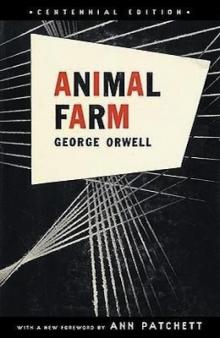 Animal Farm & 1984
Animal Farm & 1984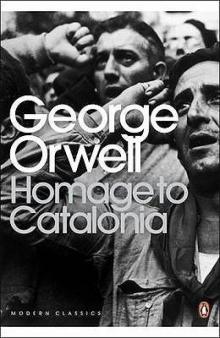 Homage to Catalonia
Homage to Catalonia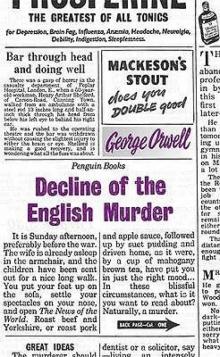 Decline of the English Murder
Decline of the English Murder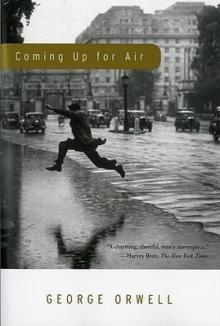 Coming Up for Air
Coming Up for Air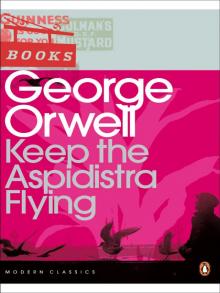 Keep the Aspidistra Flying
Keep the Aspidistra Flying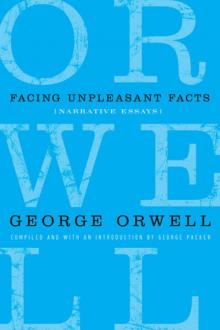 Facing Unpleasant Facts: Narrative Essays
Facing Unpleasant Facts: Narrative Essays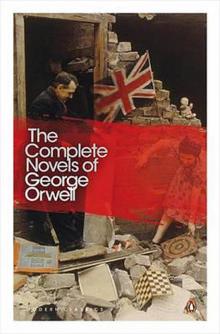 The Complete Novels of George Orwell
The Complete Novels of George Orwell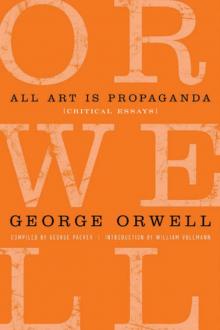 All Art Is Propaganda: Critical Essays
All Art Is Propaganda: Critical Essays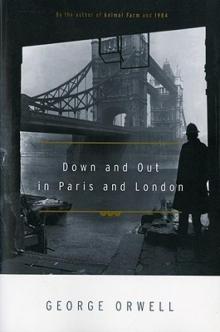 Down and Out in Paris and London
Down and Out in Paris and London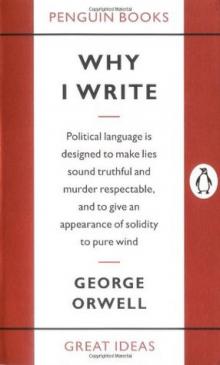 Why I Write
Why I Write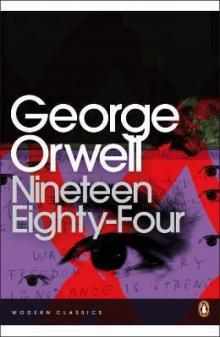 Nineteen Eighty-Four
Nineteen Eighty-Four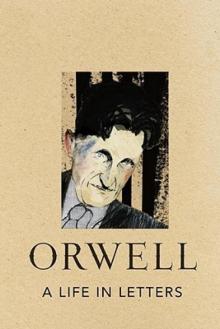 A Life in Letters
A Life in Letters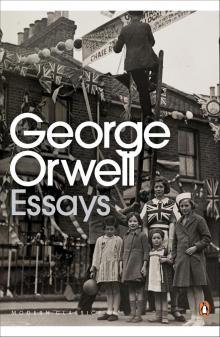 Essays
Essays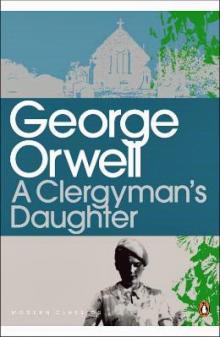 A Clergyman's Daughter
A Clergyman's Daughter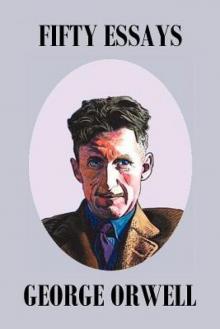 Fifty Orwell Essays
Fifty Orwell Essays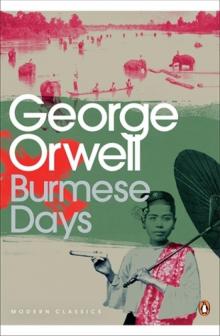 Burmese Days
Burmese Days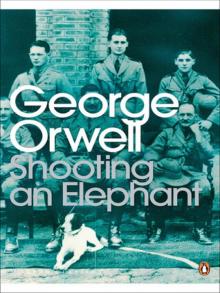 Shooting an Elephant
Shooting an Elephant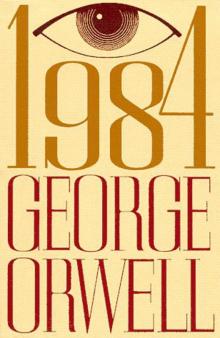 1984 (Penguin)
1984 (Penguin)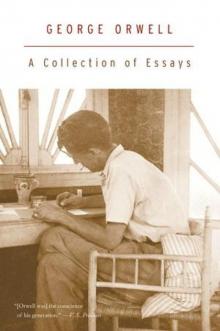 A Collection of Essays
A Collection of Essays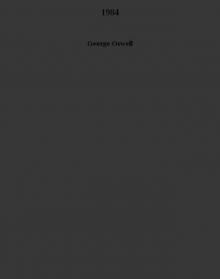 1984
1984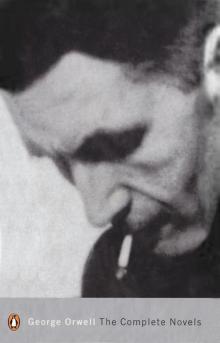 The Complete Novels
The Complete Novels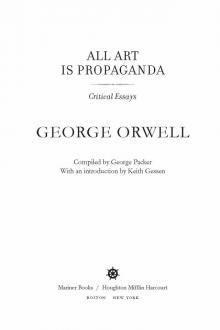 All Art Is Propaganda
All Art Is Propaganda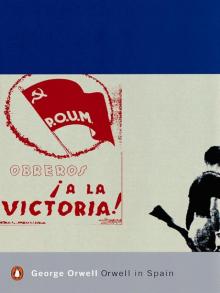 Orwell in Spain
Orwell in Spain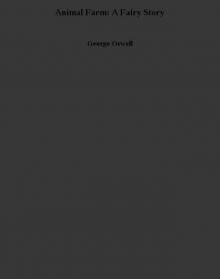 Animal Farm: A Fairy Story
Animal Farm: A Fairy Story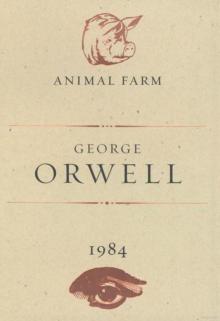 Animal Farm and 1984
Animal Farm and 1984